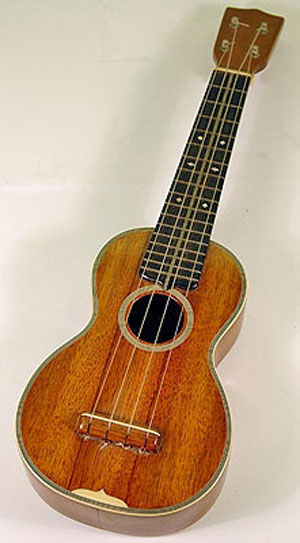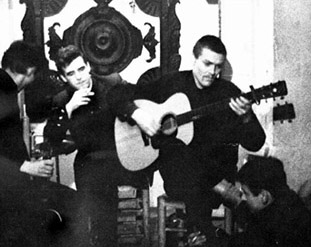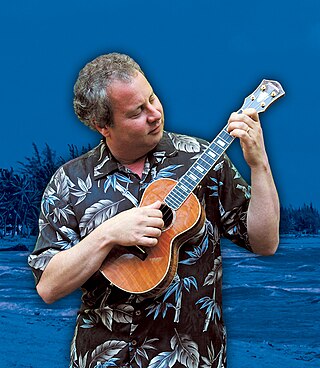The banjo is a stringed instrument with a thin membrane stretched over a frame or cavity to form a resonator. The membrane is typically circular, in modern forms usually made of plastic, originally of animal skin. Early forms of the instrument were fashioned by African Americans and had African antecedents. In the 19th century, interest in the instrument was spread across the United States and United Kingdom by traveling shows of the 19th-century minstrel show fad, followed by mass-production and mail-order sales, including instruction method books. The inexpensive or home-made banjo remained part of rural folk culture, but 5-string and 4-string banjos also became popular for home parlor music entertainment, college music clubs, and early 20th century jazz bands. By the early 21st century, the banjo was most frequently associated with folk, bluegrass and country music, but was also used in some rock, pop and even hip-hop music. Among rock bands, the Eagles, Led Zeppelin, and the Grateful Dead have used the five-string banjo in some of their songs. Some famous pickers of the banjo are Ralph Stanley and Earl Scruggs.

The ukulele, also called a uke, is a member of the lute family of instruments of Portuguese origin and popularized in Hawaii. It generally employs four nylon strings.

Clawhammer, sometimes called down-picking, overhand, or frailing, is a distinctive banjo playing style and a common component of American old-time music.

The banjo ukulele, also known as the banjolele or banjo uke, is a four-stringed musical instrument with a small banjo-type body and a fretted ukulele neck. The earliest known banjoleles were built by John A. Bolander and by Alvin D. Keech, both in 1917.

D A D G A D, or Celtic tuning, is an alternative guitar tuning most associated with Celtic music, though it has also found use in rock, folk, metal and several other genres. Instead of the standard tuning the six guitar strings are tuned, from low to high, D2A2D3G3A3D4.

Fingerstyle guitar is the technique of playing the guitar or bass guitar by plucking the strings directly with the fingertips, fingernails, or picks attached to fingers, as opposed to flatpicking. The term "fingerstyle" is something of a misnomer, since it is present in several different genres and styles of music—but mostly, because it involves a completely different technique, not just a "style" of playing, especially for the guitarist's picking/plucking hand. The term is often used synonymously with fingerpicking except in classical guitar circles, although fingerpicking can also refer to a specific tradition of folk, blues and country guitar playing in the US. The terms "fingerstyle" and "fingerpicking" are also applied to similar string instruments such as the banjo.

Shubb is a company that specialises in producing capos for all kinds of stringed instruments. The company was formed in 1974 by banjoists Rick Shubb and Dave Coontz. Shubb capos remain a top-selling capo forty years after their invention. Shubb wanted to create a capo that would not make his instrument go out of tune, which has resulted in ongoing efforts to refine his invention. Since 2016 at least 80% of Shubb's Capos are manufactured in China.

David Michael Gordon "Davey" Graham was a British guitarist and one of the most influential figures in the 1960s British folk revival. He inspired many famous practitioners of the fingerstyle acoustic guitar such as Bert Jansch, Wizz Jones, John Renbourn, Martin Carthy, John Martyn, Paul Simon and Jimmy Page, who based his solo "White Summer" on Graham's "She Moved Through the Fair". Graham is probably best known for his acoustic instrumental "Anji" and for popularizing DADGAD tuning, later widely adopted by acoustic guitarists.
An acoustic guitar is a musical instrument in the string family. When a string is plucked, its vibration is transmitted from the bridge, resonating throughout the top of the guitar. It is also transmitted to the side and back of the instrument, resonating through the air in the body, and producing sound from the sound hole. While the original, general term for this stringed instrument is guitar, the retronym 'acoustic guitar' – often used to indicate the steel stringed model – distinguishes it from an electric guitar, which relies on electronic amplification. Typically, a guitar's body is a sound box, of which the top side serves as a sound board that enhances the vibration sounds of the strings. In standard tuning the guitar's six strings are tuned (low to high) E2 A2 D3 G3 B3 E4.

Melbourne E. Bay, known professionally as Mel Bay, was an American musician and publisher best known for his series of music education books. His Encyclopedia of Guitar Chords, first published in 1971, remains a bestseller.

Roman Turovsky-Savchuk is an American artist-painter, photographer and videoinstallation artist, as well as a lutenist-composer, born in Ukraine. His musical works were published under various pseudonyms, including Johann Joachim Sautscheck.

Pat Kirtley is an American fingerstyle guitarist, composer and guitar educator.
Al Petteway was an American guitarist known primarily for his acoustic fingerstyle work both as a soloist and with well-known folk artists such as Amy White, Tom Paxton, Jethro Burns, Jonathan Edwards, Cheryl Wheeler, Debi Smith, Bonnie Rideout, Maggie Sansone and many others. His own compositions rely heavily on Celtic and Appalachian influences and he is known for his use of DADGAD tuning.
Elmer Ellsworth McMeen, III, is an acoustic steel-string fingerstyle guitarist. His specialty is fingerstyle arrangements of sung or strongly melodic pieces, ranging from the Irish genre, to hymns, gospel tunes and pop music. He has also composed instrumentals for guitar, and has published a book of Irish and Scottish instrumental music that he arranged for classical string trio. That book is called Celtic Treasures for String Trio. He plays and arranges guitar music almost exclusively in the CGDGAD tuning. Acoustic Guitar magazine called McMeen "the king of CGDGAD tuning".
Folk baroque or baroque guitar is a distinctive and influential guitar fingerstyle developed in Britain in the 1960s, which combined elements of American folk, blues, jazz and ragtime with British folk music to produce a new and elaborate form of accompaniment. It has been highly important in folk music, folk rock and British folk rock playing, particularly in Britain, Ireland, North America and France.
Rick Foster is a guitarist and arranger who lives in the Days Creek, Oregon area, who plays classical and popular music, but who is most closely associated with Christian music.
John H. Schneiderman is an American lutenist and guitarist born in Ithaca, New York, where his father was a member of the faculty of Cornell University. Schneiderman was introduced to music by his mother, who taught him to play the ukulele when he was six years old. He began performing at the age of nine, playing the banjo and fiddle at bluegrass festivals in California. Schneiderman received his undergraduate degree at the University of California, Irvine, studying guitar under Frederick Noad. He continued his studies at the Schola Cantorum in Basel, Switzerland with lutenist Eugen Müller-Dombois.

Gerald Ross is a musician specializing in American Roots Music – Swing, Early Jazz, Western Swing, Hawaiian, Ragtime and Blues. Playing the guitar, lap steel guitar and ukulele he has performed throughout the USA and Europe and has recorded seven solo CDs. Ross currently tours as a solo act performing and teaching ukulele and steel guitar at festivals and music camps.

Flea Market Music is an American company which publishes and sells ukulele-related books and music.
"Hilo March" is a Hawaiian popular song written by Joseph Kapeau Aeʻa. It was originally called "Ke Ala Tuberose". It has been covered by a number of musicians, Polynesian and non-Polynesian alike. It was also used in the soundtrack of SpongeBob SquarePants.












